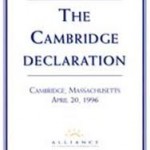 THE CAMBRIDGE DECLARATION of the Alliance of Confessing Evangelicals – April 20, 1996
THE CAMBRIDGE DECLARATION of the Alliance of Confessing Evangelicals – April 20, 1996
Evangelical churches today are increasingly dominated by the spirit of this age rather than by the Spirit of Christ. As evangelicals, we call ourselves to repent of this sin and to recover the historic Christian faith.
In the course of history words change. In our day this has happened to the word “evangelical.” In the past it served as a bond of unity between Christians from a wide diversity of church traditions. Historic evangelicalism was confessional. It embraced the essential truths of Christianity as those were defined by the great ecumenical councils of the church. In addition, evangelicals also shared a common heritage in the “solas” of the sixteenth century Protestant Reformation.
Today the light of the Reformation has been significantly dimmed. The consequence is that the word “evangelical” has become so inclusive as to have lost its meaning. We face the peril of losing the unity it has taken centuries to achieve. Because of this crisis and because of our love of Christ, his gospel and his church, we endeavor to assert anew our commitment to the central truths of the Reformation and of historic evangelicalism. These truths we affirm not because of their role in our traditions, but because we believe that they are central to the Bible.
Sola Scriptura: The Erosion Of Authority
Scripture alone is the inerrant rule of the church’s life, but the evangelical church today has separated Scripture from its authoritative function. In practice, the church is guided, far too often, by the culture. Therapeutic technique, marketing strategies, and the beat of the entertainment world often have far more to say about what the church wants, how it functions and what it offers, than does the Word of God. Pastors have neglected their rightful oversight of worship, including the doctrinal content of the music. As biblical authority has been abandoned in practice, as its truths have faded from Christian consciousness, and as its doctrines have lost their saliency, the church has been increasingly emptied of its integrity, moral authority and direction.
Rather than adapting Christian faith to satisfy the felt needs of consumers, we must proclaim the law as the only measure of true righteousness and the gospel as the only announcement of saving truth. Biblical truth is indispensable to the church’s understanding, nurture and discipline.
Scripture must take us beyond our perceived needs to our real needs and liberate us from seeing ourselves through the seductive images, cliche’s, promises. and priorities of mass culture. It is only in the light of God’s truth that we understand ourselves aright and see God’s provision for our need. The Bible, therefore, must be taught and preached in the church. Sermons must be expositions of the Bible and its teachings, not expressions of the preachers opinions or the ideas of the age. We must settle for nothing less than what God has given.
The work of the Holy Spirit in personal experience cannot be disengaged from Scripture. The Spirit does not speak in ways that are independent of Scripture. Apart from Scripture we would never have known of God’s grace in Christ. The biblical Word, rather than spiritual experience, is the test of truth. Continue reading
